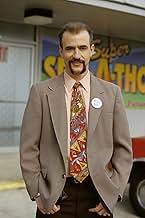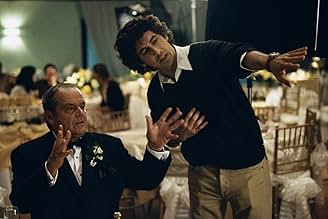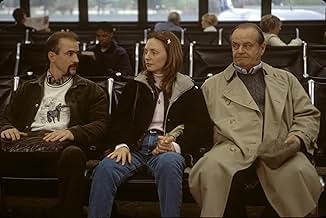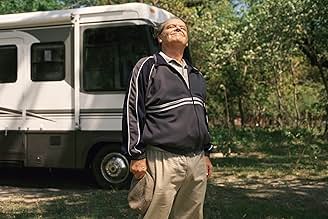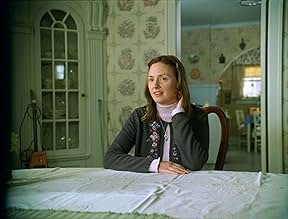Ein gerade in den Ruhestand getretener Mann macht sich auf den Weg zur Hochzeit zu seiner ihm fremd gewordenen Tochter und entdeckt auf dieser Reise mehr über sich selbst und das Leben, als ... Alles lesenEin gerade in den Ruhestand getretener Mann macht sich auf den Weg zur Hochzeit zu seiner ihm fremd gewordenen Tochter und entdeckt auf dieser Reise mehr über sich selbst und das Leben, als er jemals vermutet hätte.Ein gerade in den Ruhestand getretener Mann macht sich auf den Weg zur Hochzeit zu seiner ihm fremd gewordenen Tochter und entdeckt auf dieser Reise mehr über sich selbst und das Leben, als er jemals vermutet hätte.
- Regie
- Drehbuch
- Hauptbesetzung
- Für 2 Oscars nominiert
- 25 Gewinne & 71 Nominierungen insgesamt
- Randall's Best Man
- (as James Micheal Connor)
- Neighbor Lady
- (Gelöschte Szenen)
Empfohlene Bewertungen
The beauty of About Schmidt is how well developed and interesting the characters are. They feel like real people struggling with real situations, which is a surprisingly difficult trick to pull off. This success can be attributed to the strength of the script and most importantly to the uniformly superb acting.
This film provides a showcase for Nicholson to display his talent, and he doesn't disappoint, delivering a superb and multi-layered turn, which is a world away from the smirking characters he often plays. He allows his face to droop, and adopts a world-weary expression, as Schmidt continually finds himself at the mercy of events.
One of Schmidt's first decisions when he determines to get out of the rut he finds himself in is to sponsor an African child. This doesn't have much to do with the rest of the plot, but provides an outlet for Schmidt's innermost thoughts, and is a brilliant and original way of allowing the audience inside the head of the central character.
About Schmidt succeeds in tackling the subject of old age, a topic not often addressed in mainstream Hollywood fare, and for that it should be applauded. This is a terrific film, which features Nicholson at his best.
Such a slice of life-American life with it's many warts-warts that the Americans probably don't even recognize: Winnebagos like moving palaces, freeway monuments to genocide, business that consumes it's workers only to dump them unceremoniously, too much of everything that amounts to emptiness, etc., etc. The novel by Begley, upon which the film was based, illustrated this consumer emptiness brilliantly by the inclusion of the bookends to the film, the sponsorship of the Tanzanian child by Schmidt. The child's material emptiness was contrasted with Schmidt's emotional emptiness in a way America does not recognize much less watch on the screen.
The last part of the movie dealing with the marriage of Schmidt's daughter to a man who came from a diametrically opposite "new age" family was an unstated acknowledgment by his daughter that she wanted nothing of her father's values-she wanted a complete break and she was going to marry the break.
A fascinating, complex movie and I'm sorry I didn't see it much earlier.
About Schmidt moves slowly, but it moves with grace. The film's success is deeply in debt to Jack Nicholson, subordinating his personality to the character of Warren Schmidt. It must have been difficult for somebody like Nicholson to display the role's required lack of passion without letting Schmidt lose his human touch. Yet, his portrayal is excellent in its understatement, and his numerable supporting actors do not disappoint either. Fans of Nicholson will be assured in their belief, that their favourite is not only one of the best, but also one of the most versatile actors still working today.
Apart from the acting, director Alexander Payne's film is also well crafted. The somewhat saddened mood is only enhanced by documentary-like shots, constantly making us aware that what we witness is really an everyday-tragedy. The script shows intelligence, and although it contains many subtleties, most of them will not go unnoticed with attentive viewers. Even though About Schmidt is billed as a comedy, it really is a drama. Many of the humorous situations are more tragic than funny, and truly hilarious moments are rare occurrences.
I've often wondered whether the title of About Schmidt has been chosen with any clear intent. The German surname Schmidt equals Smith in English and is one of the most common. So about Schmidt could actually mean "About Everybody". Everybody can wake up one day and discover that everything he or she has devoted himself to, amounts to nothing. It's a frequent social phenomenon, that people suddenly wise up that their lives are almost over, without ever having fully lived them. Maybe that's how all the sea cruises and world tours of old pensioners can be accounted for. Like Schmidt, they are all making a desperate effort to catch up on a time that's long done and over with.
The film does not exactly give answers and, like in reality, does not end with any true revelations to escape all bleakness. But there is something it often likes to apply, namely the self explanatory power of irony. Like one time during the film, when Warren Schmidt decides to adopt a six-year old African foster child by mail. A cheque of twenty-two dollars, which he dutifully provides on a monthly basis, assures that little Ndugu can go to school, gets sheltered, fed and clothed. Yet, in one of his letters Warren writes to him: "What difference has my life made to anyone? None that I can think of. None...at all!"
Well, think again, Mr. Schmidt.
In 'Citizen Kane' (1941), the director Orson Welles portrays the same idea when creating Mr. Kane. The movie is more than the story of a tycoon's rise and fall; it is an account of what is ultimately important in a person's life. Even though Kane attains riches and prestige, he is far from happy. He ends with two failed marriages and few friends. At his dying bed, all he has left is his reminiscences - and something called "Rosebud." In 'About Schmidt' the director Alexander Payne uses voiceover to convey Jack's thoughts and memories throughout the movie. To be specific it is when Jack is writing a letter to the boy he sponsors - (Ndugu), at the same time Payne is informing the audience about Jack's regrets and pain concerning his wife and daughter while the movie is still rolling on. I think this is a great technique.I believe this has been a great adventure and wake up call to many Americans as to what is important in life and why we should cherish every moment of it.
In the lead role as Warren Schmidt is none other then Jack Nicholson, with an already astute résumé, only further strengthens his long career with his subtle and charming performance. The charm never wears off with the audience as Schmidt's morals and interest for the most part stay in place in his heart and mind. Unfortunately in the tale of Schmidt in the film not only does his charm wear off but he is seen as a liability by those who he thought of as his loved ones. His life takes this crash when he retires from his career and an insurance agent. Soon after he realizes he may have wasted his entire life away. The downward spiral of his life and his sense of purpose hangs on the thread of a boy he has never even met.
As subtle as Nicholson's performance is, so is the writing. It is quietly very witty which almost inconspicuously gives off a whole lot of cynicism. Along with Alexander Payne writing the screenplay he directed the film as well. The movie is certainly not all style and why should it be when that could possibly be the only thing that could really hurt this film. The film is about humanity in a raw and complex way, sometimes the best method of showing this is through simplicity to the point where you are almost certain there is something else that lies behind the curtain of it all.
There is no doubt I would recommend this film but don't expect a pure comedy. Instead try and take a fresh and real look at the entire movie and the events that take place. Depending on who you are, you may find certain points of this movie to be either sorrowful and dejected or slightly uplifting and optimistic. Just don't make a heartless joke of it, because none of us want to think of our life as that; a joke.
Wusstest du schon
- WissenswertesWhen Jack Nicholson received the Golden Globe for Best Actor in a Drama, he commented afterward, "I'm a little surprised. I thought we had made a comedy."
- PatzerAt the wedding, the priest/minister wears the wrong color of vestments: a purple chasuble and blue stole - purple is for Lent and blue is for Advent. The appropriate color for a wedding in terms of church vestments (be it Catholic, Episcopalian or other) is white.
- Zitate
Warren Schmidt: Relatively soon, I will die. Maybe in 20 years, maybe tomorrow, it doesn't matter. Once I am dead and everyone who knew me dies too, it will be as though I never existed. What difference has my life made to anyone. None that I can think of. None at all.
- Crazy CreditsThe film title appears above the New Line Cinema Release credit as end credits are done.
- VerbindungenEdited into Nudes in the News: Show #102 (2005)
- SoundtracksYou Sexy Thing
Written by Errol Brown and Tony Wilson
Performed by Hot Chocolate
Courtesy of EMI Records Ltd.
Under license from EMI-Capitol Music Special Markets
Top-Auswahl
- How long is About Schmidt?Powered by Alexa
Details
- Erscheinungsdatum
- Herkunftsland
- Sprache
- Auch bekannt als
- Las confesiones del Sr. Schmidt
- Drehorte
- Messiah Lutheran Church, 5015 S. 80th Street, Omaha, Nebraska, USA(Church where the wedding takes place)
- Produktionsfirmen
- Weitere beteiligte Unternehmen bei IMDbPro anzeigen
Box Office
- Budget
- 30.000.000 $ (geschätzt)
- Bruttoertrag in den USA und Kanada
- 65.016.287 $
- Eröffnungswochenende in den USA und in Kanada
- 282.367 $
- 15. Dez. 2002
- Weltweiter Bruttoertrag
- 105.834.556 $
- Laufzeit2 Stunden 5 Minuten
- Farbe
- Sound-Mix
- Seitenverhältnis
- 1.85 : 1
Zu dieser Seite beitragen



